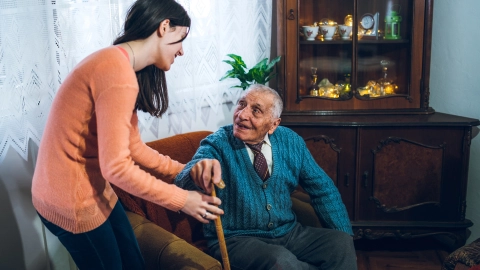Care Palliative care for the critically or terminally ill
People who are critically ill or close to death require particular care and attention. Dedicated support and care services are therefore available to them and to their loved ones, including outpatient palliative care or hospice care.
At a glance
- People who are critically or terminally ill are entitled to specific supports and services that are covered by statutory health insurance.
- These focus on palliative and psychosocial care.
- Palliative care can be provided at home, in hospital, in a care facility or in a hospice.
- Specialized outpatient palliative care (SOPC) aims to enable people to remain in their familiar surroundings at home until the end of their life.
- Hospice care is provided free of charge for people with statutory health insurance.

How can quality care be provided to critically and terminally ill people?
Terminally and critically ill people should receive high-quality care and support in every respect as they approach the end of their lives. They are entitled to special supports and services, in particular palliative care.
The word “palliative” is used to describe measures aimed at alleviating patient suffering and the effects of their illness for the time they have remaining. Rather than seeking to prolong life at any cost, the goal of palliative care is to ensure the highest possible quality of life. The focus is on the wishes, goals and well-being of patients and their loved ones.
Palliative care includes medical, nursing, psychological and pastoral care of people at the end of life. Patients are cared for by a multi-disciplinary team of people with different expertise.
The “Das ist palliativ” (“This is palliative”) portal operated by the German Association for Palliative Medicine (Deutsche Gesellschaft für Palliativmedizin e.V.) explains which kinds of professionals work together to support critically and terminally ill people at the end of their lives.
Where is palliative care provided?
Palliative care is possible at home, in hospital, in a care facility or in a hospice. Palliative care is considered one of the standard services covered by statutory health insurance. People with private health insurance will need to ask their insurance provider about the cover they offer in this area.
There are special services for the palliative care of children and adolescents. Pediatric palliative care supports young patients with a life-threatening condition and their families.
You will find information about this in the article dealing with palliative care for children and adolescents.
When does health insurance cover the costs of palliative care?
Depending on how advanced their illness is, people with incurable conditions are eligible for different forms of palliative care covered by statutory health insurance.
When is a person entitled to outpatient palliative care?
Some people have several months or years left to live following diagnosis of a terminal illness. They are entitled to receive primary palliative care and support. This is usually organized by their primary care physician (family doctor).
If a patient’s life expectancy is limited to a number of days, weeks or months, if their condition is incurable or the patient no longer wants their illness to be treated, they are entitled to be provided with outpatient palliative care.
There are two levels of palliative care:
- general outpatient palliative care or GOPC (“AAPV” in German)
- specialized outpatient palliative care or SOPC (“SAPV” in German)
GOPC is a particularly highly qualified and coordinated form of outpatient palliative care. It is suitable for patients who do not (yet) require specialized outpatient palliative care (SOPC). Doctors must meet certain criteria for GOPC.
Patients are entitled to SOPC if:
- they require particularly complex care from professionals with specific palliative knowledge and experience
- other outpatient forms of care, such as outpatient hospice care, are not adequate or require a huge amount of organization
- they have diverse, severe symptoms
SOPC must be prescribed by a doctor. It can only be provided by doctors who have completed specialist advanced training in palliative medicine.
When is a person entitled to inpatient palliative care?
Statutory health insurance only covers inpatient care in a hospital or hospice if palliative care at home is no longer possible. A hospital referral from a doctor is required in order to be admitted to a palliative unit in a hospital. For care in a hospice, it is necessary to have a medical certificate stating that this type of care is necessary.
Statutory health insurance funds cover 95% of eligible costs. The remaining costs are covered by donations.
What options are available for outpatient palliative care at home?
Most people want to spend their final days at home. To make this possible, home care services, family doctors and interdisciplinary teams of specialists provide end of life care and support.
Depending on their current condition, patients with statutory health insurance are entitled to:
- primary palliative care and advice
- general outpatient palliative care (GOPC)
- specialized outpatient palliative care (SOPC)
In addition, they can access volunteer outpatient hospice services.
What does primary palliative care involve?
When a patient is diagnosed with a life-limiting incurable condition, their primary care physician is a good first port of call to discuss the next steps.
In addition to providing primary care to the patient, the doctor coordinates and prescribes subsequent elements of their care. This includes providing them with medication, home nursing, medical rehabilitation, therapeutic services and medical aids.
The doctor and patient also discuss which aspects of treatment planning are important. In addition, the doctor can provide the patient with advice about important advance healthcare directives.
Important: Those in employment can obtain full-time or part-time leave from work for up to three months to accompany a family member with an incurable illness in the final stage of life. A doctor’s certificate detailing the medical condition must be submitted for this purpose.
More information about end of life care leave is available from the Federal Ministry of Family Affairs (Bundesfamilienministerium).
What is general outpatient palliative care (GOPC)?
GOPC is a particularly highly qualified and coordinated form of outpatient palliative care. It is suitable for people who have a limited amount of time left to live because they are at an advanced stage of their illness.
This type of care is usually provided by doctors with a special qualification in palliative medicine. They begin by determining the patient’s palliative care needs and creating a (pain) treatment plan and emergency plan. They also arrange for additional medical and nursing care with therapists, care services or hospices.
If necessary, doctors can also make house calls and can be contacted by phone outside of visiting hours.
What is specialized outpatient palliative care (SOPC)?
If a patient’s condition deteriorates further and they require more intensive care by specialists, they can avail of SOPC.
With this type of care, the patient is looked after by a team of specialists from different disciplines. Specially trained palliative nurses and specialist doctors provide pain treatment and treat other symptoms. If necessary, the team also includes professionals from the areas of psychology, physiotherapy and social work.
What support is available from outpatient hospice services?
Most outpatient hospice services are operated on a volunteer basis. They regularly visit patients at home and are available to talk and offer advice to family members. They help critically and terminally ill patients and their loved ones to cope with the situation they find themselves in. However, outpatient hospice services do not provide any medical, nursing or palliative care.
What type of palliative care is provided in a nursing home?
Palliative support is part of the care provided in nursing homes. As such, nursing homes are obliged to work in collaboration with outpatient hospice services and to have cooperation agreements in place with general practitioners and specialist doctors.
They must ensure that their collaboration with hospices and palliative care services is transparent. If necessary, residents in nursing homes can also avail of specialized outpatient palliative care (SOPC).
Collaboration with therapists and specialists from the areas of medicine, nursing and hospice care aims to ensure that patients receive coordinated, holistic care.
How is palliative care in hospital organized?
If suitable palliative care cannot be provided on an outpatient basis, patients can be cared for in a hospital setting. This may be the case, for example, if a patient has severe symptoms that cannot be treated at home.
Some hospitals have established special palliative wards or units for this purpose. Here, specialists seek to alleviate both physical symptoms and emotional distress. Support is also provided for the patient’s loved ones.
Important: A hospital referral from a doctor is required in order to be admitted to a palliative unit.
The goal is to relieve symptoms to the point that patients can return home or can be discharged to a care facility or hospice.
If the hospital does not have a palliative ward or unit, patients receive palliative medical care in a suitable medical ward. Some hospitals have a palliative service to support the team on the ward in providing palliative care.
When is hospice care considered?
Hospices are inpatient facilities in which critically ill people who are close to death can receive holistic care in the final stages of life. They are designed for patients who require specialist care but do not need intensive medical treatment.
Paid employees and trained volunteers work together in a hospice setting. Medical care is usually provided by general practitioners.
The focus is on providing care and psychosocial support to critically ill patients and their loved ones. This means that hospice workers help patients to process their feelings and worries, as well as take care of practical matters. They are also available to support loved ones and sometimes take care of the dying patient on their behalf.
Important: There are special hospices for children and adolescents. Unlike hospices for adults, these are not specifically designed for the final stages of life. Children and adolescents and their families are cared for and supported here for longer periods following a diagnosis.
What are the criteria for admission to a hospice?
The following admission criteria apply:
- The patient has a life expectancy of a number of days, weeks or months.
- The patient can no longer be cared for in their usual living environment.
- Treatment in a hospital is no longer required or no longer beneficial.
In order for the health insurance provider to cover the costs, a doctor must provide a certificate stating that these criteria have been met and that hospice care is medically necessary. This certificate of necessity must be submitted to the statutory health insurance provider together with the application for cost coverage.
If the application is approved, 95% of eligible costs will be covered by the patient’s statutory health insurance. The benefits provided by other cost bearers (such as long-term care insurance providers) are taken into account. The hospice uses donated funds to cover the remaining costs. People with private health insurance should ask their provider whether the costs of hospice care are covered.
Where can critically ill people and their families find information and advice?
Family doctors, health insurance providers and local non-profit organizations provide advice and support in relation to palliative care. Statutory health insurance funds are obliged to provide their members with an overview of contact details for advice and support centers in the region if this is required.
The hospice and palliative care information database (“Wegweiser Hospiz- und Palliativversorgung”) offered by the German Association for Palliative Medicine (Deutsche Gesellschaft für Palliativmedizin e.V.) contains the addresses of more than 3,000 services and facilities located throughout the country.
The German Association for Palliative Medicine provides brochures for people with a life-threatening condition and their loved ones. Their brochures deal, for example, with how to talk to doctors in hospital and psychosocial support measures for parents and adult children.
People in need of care and their loved ones can seek advice on palliative care from care advice centers, including care support points.
You will find the contact details for care support points in the database of the Center for Quality in Care (Zentrum für Qualität in der Pflege, ZQP).
- Bundesministerium der Justiz. Sozialgesetzbuch (SGB), Fünftes Buch (V) - Gesetzliche Krankenversicherung. Stand: 16.09.2022.
- Bundesministerium für Gesundheit (BMG). Hospiz. Aufgerufen am 16.01.2023.
- Deutscher Hospiz- und Palliativverband e.V. Palliative Care. Aufgerufen am 16.01.2023.
- Gemeinsamer Bundesausschuss (G-BA). Spezialisierte ambulante Palliativversorgung. Aufgerufen am 16.01.2023.
- Kassenärztliche Bundesvereinigung. Palliativversorgung. Möglichkeiten der ambulanten Versorgung, Praxisbeispiele und rechtliche Hinweise. Aufgerufen am 16.01.2023.






